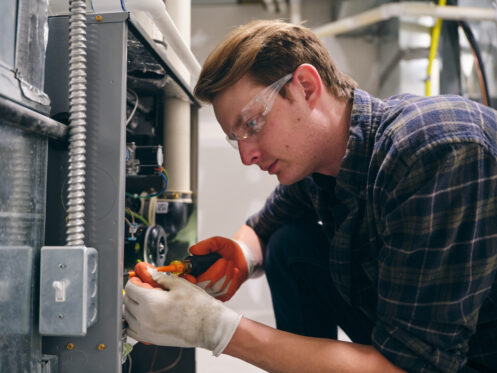As another winter season approaches, homeowners everywhere are getting their homes ready for cold weather. One aspect of your home that you never want to overlook is your HVAC system. Learn the best tips for appropriately prepping your HVAC system for the upcoming winter season.
Cover Your AC Unit
Protecting your outdoor condenser unit during winter is essential if you have a central air conditioning system. Covering it helps shield the unit from leaves, twigs, and snow that may get inside and damage its internal components. The simplest way to cover your condenser is to buy a product designed for this purpose.
When selecting the best cover, look for one that is made from breathable material to prevent moisture buildup, which can lead to mold and corrosion. A waterproof one is ideal for keeping out rain and snow, but ensure it has vents for airflow. Additionally, choose a cover that fits snugly but isn’t overly tight. Covers with elastic hems or adjustable straps can provide a secure fit while allowing for adequate ventilation.
Change Air Filters
It’s always a good idea to put a fresh air filter in your HVAC system before starting it up for the winter season. A clean filter will help your system run smoothly, as a dirty one can restrict airflow and reduce efficiency. It’s a good rule of thumb to have at least one extra air filter on hand. Experts recommended changing out HVAC filters at least every 90 days. However, you may need to change yours more often due to factors like how many people live in your household, if you have pets, and how often your system runs. Many homeowners inspect their filters once a month so that they know when they need to be replaced.
Clean Your Chimney
If your heating system burns fuel to create heat, such as a traditional gas or oil furnace, then your heating system likely vents exhaust gases through your chimney. Having your chimney cleaned annually is essential to remove any soot buildup that could restrict airflow and pose safety hazards. During this service, a professional will also let you know about any issues with your chimney’s structural integrity.
Order Fuel
Now is the perfect time to go ahead and get on the phone with your fuel company and schedule a delivery. Ensuring you have enough fuel before the colder months hit can help avoid last-minute emergencies and potential delivery delays. Placing your order early also allows you to take advantage of competitive pricing.
Seal Up Air Leaks
Air leaks around your home are common and can significantly impact your home’s heating efficiency. Sealing these leaks is essential to prevent cold outdoor air from entering and causing your heating system to work harder than necessary. Weather stripping and caulking are effective solutions for addressing air leaks around doors and windows. Additionally, you can use foam inserts behind the cover plates of your electrical receptacles and light switches on exterior walls to further reduce cold air seepage. Taking these simple steps can help maintain a comfortable indoor environment while reducing your heating costs.
Program Your Thermostat
If you don’t already have a programmable thermostat, it may be time to consider an upgrade. These thermostats allow you to program in temperature settings based on the time and day of the week. This means that you can set the temperature to be colder when your family is sleeping or everyone is away at school or work. The Department of Energy suggests that households who program their thermostats can save up to 20% on heating costs annually.
Adjust Ceiling Fans
Running ceiling fans is one of the most effective ways to enhance your home’s energy efficiency. In the winter months, it’s important to set your ceiling fans to spin in a clockwise direction. This adjustment helps recirculate the warm air that collects near the ceiling back down to the floor, allowing for more even heat distribution. By using fans in the winter, you can lower your temperature setting without compromising comfort to save money.
Test Run Your Heating System
Giving your heating system a test run will help ensure that it’s working before you need to use it daily. Be sure to set the temperature about five degrees warmer than the ambient temperature. Listen for your heating system to kick on and start running. You may notice a slight burning smell for the first few minutes. This odor is simply dust burning off and should dissipate very quickly.
As your heating system is running, you want to be listening for any weird noises or take note of any lingering smells. Be sure to check each supply vent to make sure that warm air is coming out of it. If you notice that any of your supply vents are producing cold air, contact an HVAC technician to assess your ductwork in that location.
While assessing your air vents, you should remove anything covering them. Household items like area rugs, curtains, and furniture can block supply vents, causing cold spots. Alternatively, items blocking return vents can reduce airflow to your HVAC equipment, causing it to overheat. You want at least 12 inches of clearance around each supply and return vent to ensure adequate airflow.
Check Safety Devices
At the bare minimum, your home should have both a smoke detector and a fire extinguisher. If you have a heating system that burns fuel, then you’ll also need to have carbon monoxide detectors. It’s critical to check all the batteries in these detectors and press their test buttons to ensure that they’re working correctly. Also, be sure to check the date on your fire extinguisher to verify that it’s still valid.
Schedule a Tune-Up
Booking a professional maintenance service for your heating system is essential. Aim to schedule this service in early fall. This timing allows a professional to identify and address any potential issues before the cold weather arrives. It’s important to remember that this maintenance is often not optional; many warranty contracts require homeowners to have professional service at least once a year. Neglecting this requirement could result in the manufacturer denying future warranty claims for your heating system.
Consider a Professional Ductwork Inspection
If it’s been a while since you had a professional inspect your ductwork, you could be paying more to heat your home than necessary. According to the Department of Energy, faulty ductwork can result in losing up to 30% of the hot air your heating system produces. During an inspection, a technician can use video cameras and air pressure tests to identify these issues and recommend solutions.
Contact Your Local Professionals
At Simply Mechanical, we have served the residents of Littleton, CO and the surrounding areas since 2018. We install, maintain, and repair heating and cooling systems. We can also help with all your indoor air quality needs and update your home with smart thermostats. Contact us today to schedule an appointment for a furnace tune-up with one of our talented team members.

